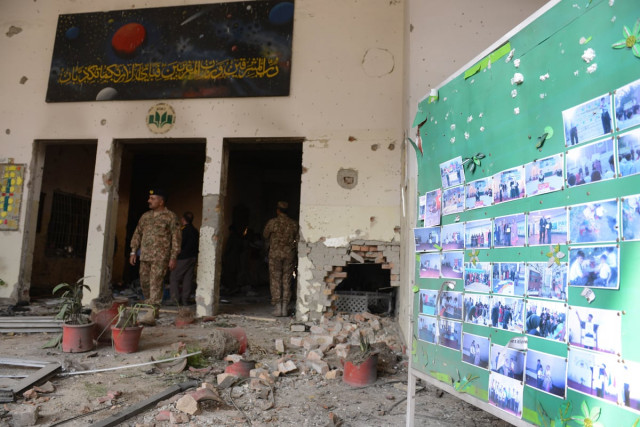Bleeding from taut veins: A city under siege
The attack on Army Public School on Warsak Road was as brutal a revenge as can be.

The entire nation, security apparatus the most, must have been smug about the lack of resistance from the Tehreek-e-Taliban (TTP) after military operations Zarb-e-Azb and Khyber-1 were launched in North Waziristan and Khyber agencies earlier this year. In 2009, two or three attacks took place in a week. Truck bombings and suicide blasts literally set Peshawar on fire. But what was beginning to seem like a relatively peaceful year, took a turn as bloody as it did just when word was getting round that TTP’s war machine had been thwarted.
In actuality, the militants were probably scouring for soft and easy targets. And the attack on Army Public School on Warsak Road was as brutal a revenge as can be: unsuspecting children and staffers versus gunmen donning suicide jackets and armed with AK-47s; they showed no mercy.
In August, there were warnings afloat about militants in Orakzai Agency planning an attack on Army Public School. Security was then beefed up. Armymen were deployed on rooftops inside the school and CCTV cameras were installed. Yet, the measures started withering with each passing day. And then the militants, who were probably observing keenly, struck with deadly accuracy.
What is most shameful is that the attack took place in one of the high-security areas of the cantonment, right under the nose of the Pakistan Army. How the attackers managed to arrive without inviting any attention will be a question that should haunt us well into the next year.
The one general consensus that is emerging in the wake of the attack is to do away with the distinction of ‘good and ‘bad’ Taliban. This is why the FIR of the assault was registered against all factions of the TTP, including the militant groups of Lashkar-e-Islam and Hafiz Gul Bahadur. The establishment’s earlier policy has been self-destructive and the entire country is waking up to that very real realization.
Yet, it is no secret the Taliban still have the capacity to wreak havoc anywhere, anytime. Schools, mosques, playgrounds and civilian offices are all vulnerable to militant attacks. In Peshawar district alone, around 331 schools have been identified as ‘sensitive’ by the police.
The cop conundrum
It was also a year of reforms for the police. Six training schools including schools of investigation, intelligence, bomb disposal, traffic school are being established across Khyber-Pakhtunkhwa. Police Assistance Lines (PAL) has also been established in the provincial capital. FIRs have been computerised and a new SMS-based complaint system has been launched for people to register complaints against corrupt policemen.
Much touted as the reforms may be, there is still massive room for improvement. People complain they are asked to bring their own stationery when they go to police stations to register an FIR. They are asked to ‘donate’ diesel for mobile vans to conduct raids. The 10 litres of fuel provided for each police mobile to patrol for 24 hours a day is clearly not sufficient. Similarly, SHOs get no fuel allowance or official vehicle, compelling them to use ‘case property’ cars and take bribes for fuel.
Funds earmarked for investigation staff at police stations are often not released. Thus, those arrested are forced to pay for their own meals as well as for the chief investigation officers (CIOs). It is then no wonder that the investigation officers end up favouring the accused, who they have taken money from. The reforms will bear little fruit if the police is not made an effective force to serve the general public. For unless that happens, the city will continue to bleed. But our veins are taut, and bleed this city cannot anymore.
Published in The Express Tribune, December 31st, 2014.






1724319076-0/Untitled-design-(5)1724319076-0-208x130.webp)






COMMENTS
Comments are moderated and generally will be posted if they are on-topic and not abusive.
For more information, please see our Comments FAQ